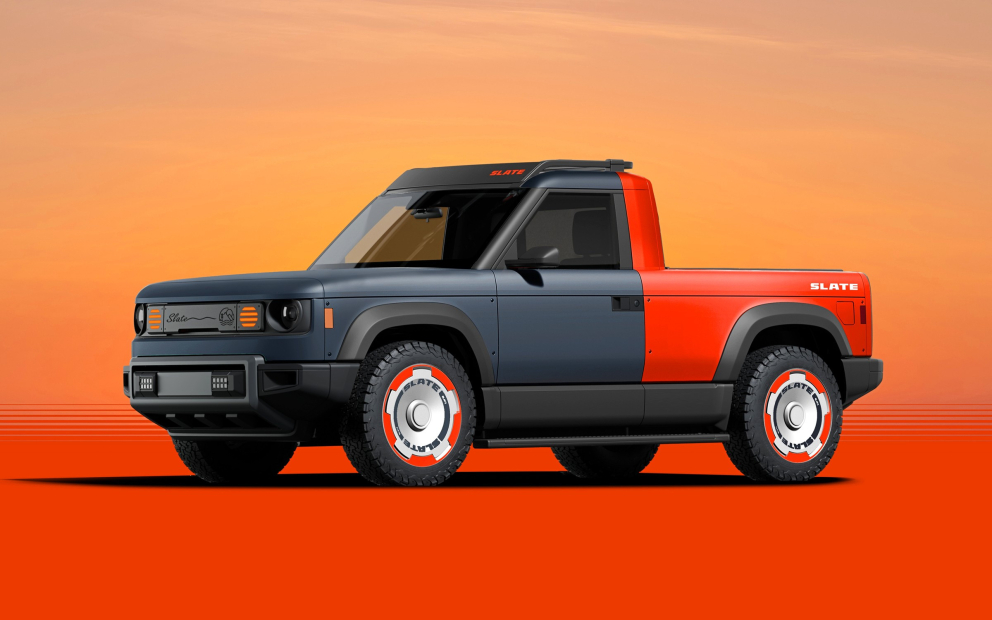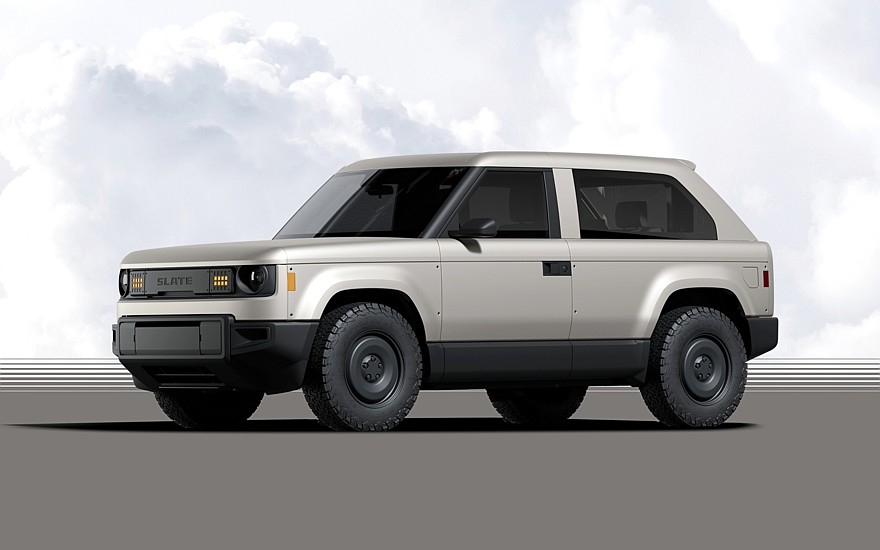Slate Truck: New Startup With Affordable Modular Electric Pickup Truck
Concept and Positioning A new startup, Slate Truck, based in Long Beach, California, has announced plans to launch an affordable modular electric pickup truck. The company promises to do what many automakers have promised for years but rarely deliver on: produce an affordable electric vehicle that appeals to a wide range of buyers. Slate estimates that after a $7,500 federal tax credit, the vehicle could cost less than $20,000. The company’s CEO, Chris Barman, says the goal is to put the control of car choices back in the hands of consumers, who are typically not consulted by the traditional auto industry.
Design and construction In January, while demonstrating a prototype, former vice president of Stellantis presented to journalists a sample design that combines an innovative approach and classic technical solutions:
- Construction: Steel wheels, mechanical windows, no touchscreen.
- Materials: Plastic body panels made by injection molding, reminiscent of Saturn cars.
- Service Approach: No expensive paint shop with transition to the use of individual films and a "do-it-yourself" philosophy in vehicle ownership.
- Additional features: The company plans to offer accessories to personalize the truck, as well as a kit to convert the two-seat truck into a five-seat SUV.
Dimensions and versatility of the body The pickup has a length of 443.5 cm and a wheelbase of 276.6 cm, which is almost 60 cm less than models such as the Ford Maverick and Hyundai Santa Cruz. Key features:
- Height: 176 cm – much taller than the Nissan Leaf.
- Cargo area: 152 cm long (or 207 cm with the tailgate down). The body walls rise to chest height for an average-sized person and the width between the wheel arches is 109 cm, allowing easy access without using steps.
- Modularity: The basic configuration is a classic pickup truck. The prototype also demonstrates the possibility of converting into: SUV with a three-seater rear seat, airbags and installed protective bars, SUV with a fastback body, Open SUV with protective bars.
- An SUV with a three-seater rear seat, airbags and installed roll bars,
- SUV with a fastback body type,
- Open SUV with roll bars.
The latter two options have not yet received final regulatory approval, but the design involves installing side pillars, crossbars, windows and a rear seat with pre-fabricated mounting points.
Battery system and engine The main emphasis of the Slate Truck is on economy and practicality:
- Chassis design: Frame construction with a load-bearing body, where the battery (52.7 kWh) is located in a special frame.
- Battery supplier: South Korean company SK On, which recently signed a deal with Nissan to produce batteries for electric vehicles, manufacturing them in the United States.
- Upgrade: For an additional cost of $5,000, you can get an 84.3 kWh battery.
- Charging: An integrated 11kW charger can charge a smaller battery to Level 2 in less than 5 hours; a standard NACS port and up to 120kW DC fast charging provide a 20% to 80% charge in approximately 30 minutes.
- Features: 201 hp engine with 264 Nm of torque, mounted on the rear axle. Acceleration from 0 to 96 km/h – 8 seconds, top speed – 145 km/h. Range: about 241 km with the smaller battery and up to 386 km with the larger battery option.
- The engine with a power of 201 hp and a torque of 264 Nm is mounted on the rear axle.
- Acceleration from 0 to 96 km/h is 8 seconds, maximum speed is 145 km/h.
- Range: about 241 km with the smaller battery and up to 386 km with the larger battery option.
Functionality and load capacity The truck is focused on daily use:
- Load capacity: Up to 650 kg, which can be placed in the front trunk (198 liters), the body (1048 liters) or the additional luggage compartment behind the rear seat (963 liters).
- Trailer: Maximum trailer weight is 453 kg.
- Service: Slate plans to provide battery replacement capabilities at regular service centers that previously handled oil changes and exhaust system maintenance.
Interior and additional options The interior design is positioned as practical and comfortable:
- The interior is equipped with electric locks, air conditioning with manual controls, power windows, and vinyl seats.
- Dashboard: The lack of a touchscreen is compensated by a universal phone mount with USB connectors.
- Safety: The rearview mirror doubles as a camera (as required by federal law) and includes up to 8 airbags. The system also includes automatic emergency braking.
- Accessories: About 100–200 parts will be available to order separately – from power windows to modern touch tablets and center consoles.
Financial side and success strategies Slate Truck was founded in Troy, Michigan, in 2022 and raised $111 million the following year thanks to the support of Jeff Bezos and 15 other wealthy investors.
- Market approach: Unlike many electric vehicle startups, which typically launch expensive flagship versions, Slate is targeting the budget segment, where even a $27,000 pickup truck (without federal incentives) is considered a budget product with minimal profit margins.
- Alternative revenue strategy: The startup plans to generate revenue from the sale of accessories, which is consistent with the experience of companies like Harley Davidson and Stellantis, which made money from additional features and servicing of outdated models.
Key Executives Joining Slate's leadership team are veterans of the automotive industry:
- Chris Barman – Manager,
- Tisha Johnson – Head of Design, former Vice President of Interior Design at Volvo,
- Eric Keiper – Head of Engineering, former Karma and Chrysler employee,
- Jeremy Snyder is the director of commercial affairs, a former Tesla representative.
Project Outlook and Future Slate Truck production will begin late next year at an old paper mill in Warsaw, Indiana. Pre-orders are now open – make a $50 deposit at slate.auto. Despite the huge competition and historical difficulties of startups in this field (Nikola, Lordstown, Workhorse, Faraday, Fisker, Canoo, etc.), the backing of billionaires and the experience of industry veterans give hope for success. Time will tell whether Slate will succeed where others have failed.



